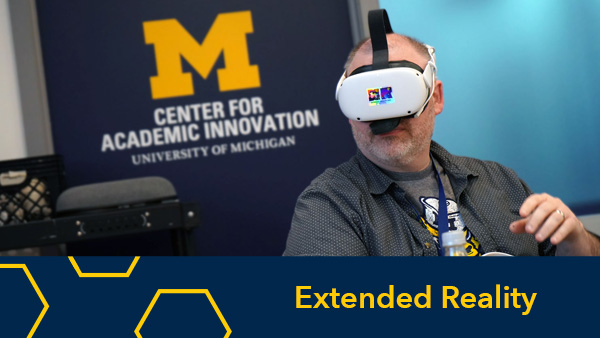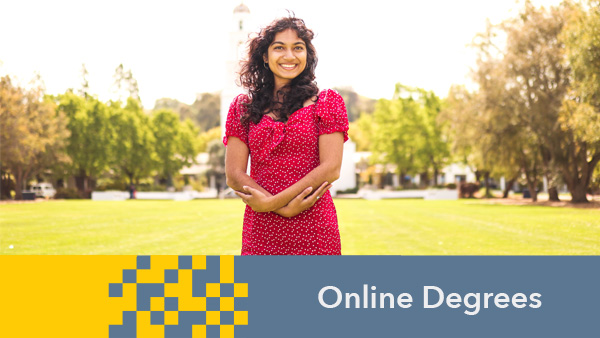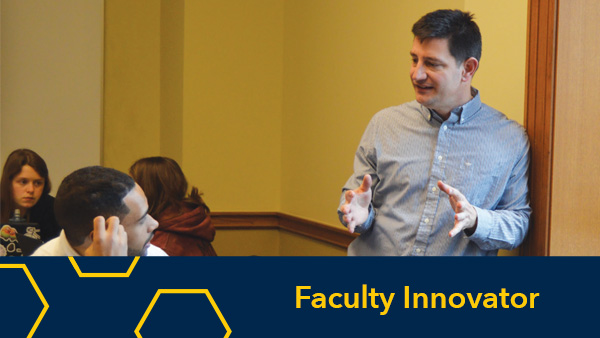Sean Corp, Communications Lead
The University of Michigan is developing more than 35 short online courses in 2024 that will build learners’ generative artificial intelligence skills and competencies, with most launching by July. The courses feature contributions from 16 faculty representing eight of U-M’s schools and colleges and are being developed in collaboration with the Center for Academic Innovation.

“Generative AI is transforming teaching and learning in higher education, just as it has the potential to transform jobs and industries across our society. These courses, developed by our world-class faculty at the university in partnership with the Center for Academic Innovation, will allow learners to build skills they can use to advance their careers and build vital new job skills,” said Laurie McCauley, provost and executive vice president for academic affairs.
The center has been developing online learning opportunities focused on generative artificial intelligence technology since shortly after ChatGPT launched in November 2022. By March 2023, the center launched the “ChatGPT Teach-Out” online learning experience and later updated it with additional content for its “Generative AI Teach-Out.” In December, the center launched the short online course “Generative AI Essentials: Overview and Impact.” The three generative AI-focused online learning opportunities have seen more than 20,000 enrollments to date.
“The University of Michigan is leading the way in AI education, and we received tremendous interest from U-M faculty eager to help others understand and apply AI knowledge and tools and help leaders adopt responsible AI practices,” said James DeVaney, the associate vice provost for academic innovation and the founding executive director at the center.

“This initiative is also providing an opportunity to engage with faculty members who are new to the center and aim to share their expertise with a world of learners who are seeking valuable, trusted information about these technologies and their implications for individuals, teams, organizations, and society,” he said.
The courses will be shorter than a traditional open online course and feature a mix of fundamental knowledge-building and skill-building in using generative AI tools in various industries. The more concise format and focus on essential concepts and skills will enable working professionals to fit these courses into their free time and incorporate AI tools into their work lives, DeVaney said.
To connect people to shorter, targeted learning opportunities to build foundational AI skills, Michigan Online also has an AI Collection, which has curated playlists featuring videos, articles, and access to courses.
Major courses set to debut by July include “Llama for Python Software Developers” taught by Chris Brooks, associate professor at the School of Information. The course guides software developers using Meta’s Llama2 large language model for code generation. Andrew Wu, assistant professor at the Stephen M. Ross School of Business, is developing the course “Generative AI in Business: A Tactical and Strategic Guide” on how organizations can incorporate AI strategies into business operations. There will also be courses designed for mechanical engineers, learning experience designers, and organizational leaders with skill-building courses to use in their industries.
Patrick Barry, clinical assistant professor of law and director of digital academic initiatives at the Law School, has worked regularly with the center on open online course series to improve writing and communication skills. Barry will launch a short online series called “AI for Lawyers” to build lawyers’ skills in using AI tools in their work.
Other courses will provide a more foundational understanding of generative artificial intelligence. Mark Guzdial and Steve Abney of Michigan Engineering and LSA, respectively, will launch a course around the mechanics of large language models, the ethical issues around AI, and general AI training. Merve Hickok, School of Information, will explore the ethical considerations of AI technologies and how people can appropriately support and develop the technology in the future. Tina Lasisi, assistant professor of anthropology, LSA, will launch a course designed to make learners conversant and proficient in understanding and using the most popular AI platforms. Charles Garrett and Garrett Schumann of the School of Music, Theatre, & Dance will lead a course on AI’s impact on creativity and creative industries.

“This first set of courses will provide learners with a mix of foundational knowledge, important perspectives on issues of ethical use, navigating disruption in the workforce, and how to lead in the era of AI. It will also provide targeted upskilling opportunities for people in specific industries looking to build their skills and explore how this technology can help them advance their careers,” said Nola Czarnik, director of content and platform strategy at the center.
The courses are being developed in waves, with the first release launch expected at the end of May. Subsequent releases will commence in May, June, and July. For a complete list of the courses in development, visit the Center for Academic Innovation website.
Generative AI Short Online Courses
The Center for Academic Innovation is developing a series of short courses in partnership with faculty throughout the University of Michigan. Here is a brief description of the courses and course series in development. All courses are in development and some details are subject to change.
Hands-On Introduction to How Generative AI Works
Faculty: Mark Guzdial, Steve Abney
Schools: College of Literature, Science, and the Arts
Course Series Summary: Learning the basics of AI and machine learning techniques, including neural networks, back propagation, transformers, training, and guardrails. Further exploration into the possibility of Artificial General Intelligence (AGI), how to regulate AI, and the contrast between ChatGPT and how humans learn and process language.
AI for Lawyers
Faculty: Patrick Barry
School: Law School
Course Series Summary: Taking a skill-based approach to how advocates of all kinds, including lawyers can utilize generative artificial intelligence technology. The course will explore questions such as which tools are worth using?; what questions are worth asking?; how do you add value and promote social justice in the era of generative artificial intelligence?
Llama for Python Software Developers
Faculty: Chris Brooks
School: School of Information
Course Summary: Gain a deeper understanding of Llama2, Meta’s large language model that includes Code Llama, a code generation model supporting multiple languages, including Python. Ideal for software developers, programmers, devops engineers, machine learning engineers, and data scientists looking to upskill and gain experience using LLMs for code generation. Go to course
Responsible Generative AI
Faculty: Merve Hickok
School: School of Information
Course Series Summary: Examining the possibilities and risks of generative artificial intelligence technology, and the ethical considerations for the use of the technology. Learners will be able to make informed decisions about the development, use, and governance of generative AI systems.
Unlocking Efficiency in Social Impact Organizations with Generative AI
Faculty: Brian Perron, Barbara Hiltz
School: School of Social Work
Course summary: Designed for employees at social impact organizations, learners will understand how generative AI technology could provide efficiency gains and expand organizational bandwidth for mission-critical activities. Methods explored include how AI can automatically answer frequently asked questions, convert information requests into readable reports, and draft communication materials.
Future-Proof AI Foundations: Practical Knowledge and Skills for Immediate Implementation
Faculty: Tina Lasisi
School: LSA
Course Series Summary: Bringing learners up to speed on the recent history and latest developments in artificial intelligence. After taking this course series, learners will be conversant in the topic and proficient in using the most widely adopted AI platforms, with the ability to gather, analyze, present information, and implement AI strategically into their professional roles.
AI in Mechanical Engineering
Faculty: Wei Lu
School: Michigan Engineering
Course Series Summary: Generative artificial intelligence technologies are driving a transition of the mechanical engineering profession. This course series equips current engineers with the necessary skills and understanding of how to leverage generative AI tools so they can remain at the forefront of their profession, including creating machine learning algorithms by using open source tools and platforms such as Python.
Navigating Disruption: Implications of Generative AI in the Workplace
Faculty: Josh Pasek
School: LSA
Course Series Summary: A foundational course series exploring how generative artificial intelligence is likely to influence people’s regular workplace tasks, including implications for employees, managers, customers, and clients. The course series also examines the limitations and risks firms must consider regarding if, when, and how to incorporate AI into their workflows.
Sound Practices AI, Creativity and Workflow
Faculty: Charles Garrett and Garret Schumann
School: School of Music, Theatre & Dance
Course Series Summary: Understand the possibilities and potential threats introduced by generative AI tools to music, art, and other creative disciplines. This course series examines AI’s history as a creative tool as well as the ethical concerns facing creative professionals today.
Leveraging Generative AI as a Learning Design Partner
Faculty: Chris Quintana, Rebecca Quintana
School: Marsal Family School of Education
Course Series Summary: Exploring how learning experience design professionals can incorporate generative artificial intelligence into their work. This could include the utilization of generative AI to assist with course outlines, crafting learning objectives, content creation, assessment design, and more.
Generative Leadership in an Age of Generative AI
Faculty: Monica Worline
School: Stephen M. Ross School of Business
Course Summary: Helping leaders at all levels in various industries to understand how to harness the possibilities of generative AI technology while also limiting risks. Learn how to adopt generative practices that emphasize resourcefulness and exploration to counteract what might be seen as a threat to an organization’s workforce.
Generative AI in Business: A Tactical and Strategic Guide
Faculty: Andrew Wu
School: Stephen M. Ross School of Business
Course Series Summary: Providing a comprehensive guide to business professionals on how to integrate generative AI technology into their existing business processes and organizational structures. The course series will explore important generative AI concepts, implementing AI tools in diverse data environments across industries, and the strategic deployment of generative AI tools and implementations.


